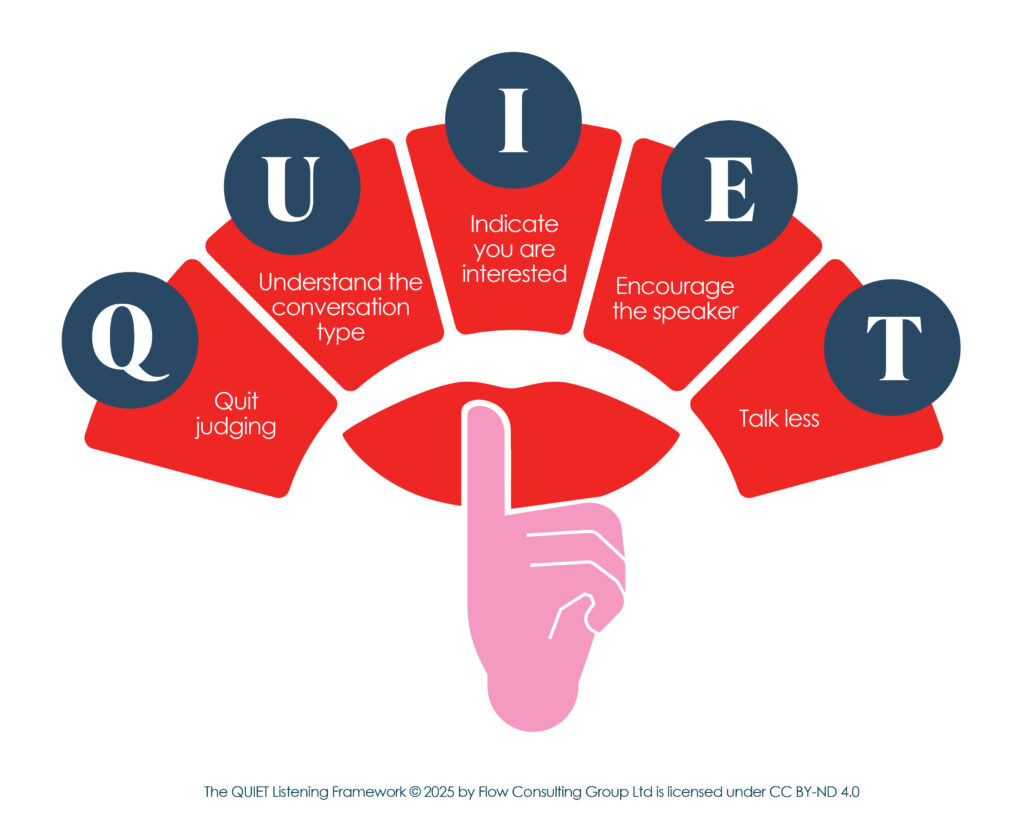From our first breath, we’re biologically wired to make noise to get observed and survive. That very same intuition carries into the office, the place talking first and loudest typically feels just like the playbook to being seen and succeeding.
However there’s one other approach. The QUIET Listening Framework will help us transfer into significant dialogue that truly achieves the outcomes we’re aspiring for.
Beneath, we’ll introduce you to the QUIET mnemonic and clarify the way to use it. However first, it’s necessary to know why dialogue is so necessary.
The second dialogue deteriorates, so does the opportunity of change
Most conferences spend loads of time in debate and dialogue, however far much less in real dialogue:
- Debate is about defending a hard and fast place and persuading others. If we’re doing any listening in any respect, it’s ‘listening to win.’ That is the kind of listening meaning others are fallacious.
- Dialogue permits for various viewpoints, but normally ends in compromise slightly than an actual shift.
- Dialogue, in contrast, begins with openness and curiosity. It goals to know others totally and co-create new prospects.
Reputational intuition, time constraints, excessive stakes and overload all conspire to squeeze out real dialogue. We’re creating dialogue-free workplaces.
Why listening to be taught is so uncommon
Once we take into consideration what has pushed our private success, we would consider that it comes all the way down to our instincts and opinions, our personal confidence in ‘what issues most’. That we’ve got a observe document in sharing opinions that have been ‘proper.’ Real studying is usually secondary to defending our views. As well as, altering your thoughts is an indication of weak spot, isn’t it?
However in a fast-changing world, what issues simply as a lot is the power to rethink, unlearn, and adapt. True ‘smartness’ lies not in being proper, however in being prepared to alter our minds in pursuit of higher outcomes.
“The speed at which you be taught and progress on the planet depends upon how prepared you’re to weigh the benefit of recent concepts even for those who don’t instinctively like them. Maybe particularly for those who don’t like them”
Ray Dalio in Ideas
This implies questioning our assumptions, asking how we is perhaps fallacious, and looking for out views that problem us. Progress comes from humility, curiosity, and the braveness to revise our views.
QUIET is the house for conversations that change views
Don’t simply be silent since you wish to seem well mannered. Use the QUIET Listening Framework introduced under to assemble new insights about an issue or alternative and get the outcomes you need quicker.

The QUIET Listening Framework’ © 2025 by Movement Consulting Group Ltd is licensed below CC BY-ND 4.0.
Give up judging
Our default place after we are listening is to consider whether or not we agree or disagree with what’s being mentioned. File producer Rick Rubin’s sharp perspective is that “listening is suspending disbelief.” Exchange judgment with curiosity. Keep open-minded to the factors being made.
Perceive the dialog sort
Is that this a dialog to enhance understanding? To generate concepts? To downside remedy? To make choices and formulate plans? It’s possible a mixture of the above. Conversations go south while you every have completely different expectations of what’s wanted, so make sure you’re in sync with one another.
Point out you have an interest
In a busy world with fixed distractions, time is essentially the most helpful factor you may give folks. The extra you show that you’re totally invested in what the opposite particular person is saying, the extra possible they’re to talk up and share their very own insights.
Nodding, giving brief acknowledgments, displaying empathy and sustaining an open, engaged posture are all methods to point you have an interest in studying.
Encourage the speaker
All of us assume a lot quicker than we are able to speak (900 phrases per minute vs. 125 phrases per minute). Which means that we frequently battle to specific our opinions clearly. Assist the speaker say what they imply through the use of phrases equivalent to:
‘Are you able to inform me a bit extra about that?’
‘Go on’
‘I observed earlier, you mentioned…’
Speak much less
This closing precept may appear too apparent to say. However in a world the place we mistakenly assume that efficient communication is nearly how effectively we communicate, it’s useful to know that the one who asks the questions and listens extra is the one who controls the dialog.
The much less we speak, the extra we take heed to be taught. The extra we be taught, the quicker we attain our targets.
Catalytic Conversations are a pressure for connection
Our potential to attain something of significance relies upon upon the high quality of {our relationships}. And the standard of {our relationships} relies upon upon the standard of our conversations.
We want greater office conversations greater than ever. To pay attention higher. To vary our views collectively. Once we follow being QUIET in our conversations, we aren’t simply studying. We’re constructing connections with others on the similar time.
Excessive-value conversations at work are below stress and first-job workers are coming into the office with much less conversational talent than earlier generations.
To shut the hole, HRZone and Movement have created the Catalytic Conversations Toolkit. The toolkit’s aim is to allow you to have conversations that convey you nearer to your colleagues and, in flip, nearer to accelerating constructive change at work. It’s going to equip you to have six various kinds of robust conversations.
In case your pure tendency is to show away from an even bigger dialog, it could actually enable you to discover the confidence to organize for a dialog you’d prefer to have.



